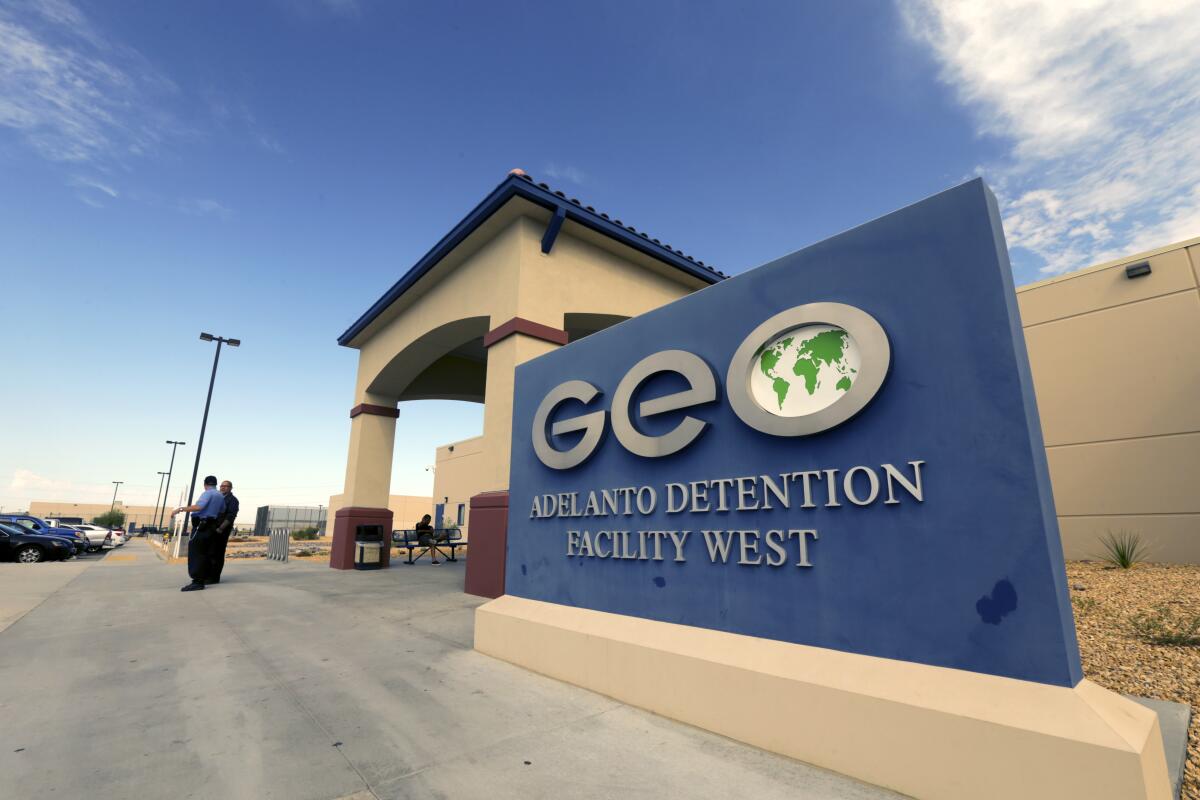Federal court says California ban on private ICE detention facilities is unconstitutional

- Share via
A California law banning private prisons and immigrant detention facilities in the state violates the U.S. Constitution when applied to facilities operated on behalf of U.S. Immigration and Customs Enforcement, a federal appellate court ruled Monday.
State officials said they were “deeply disappointed” in the decision.
The 11-judge panel of the U.S. 9th Circuit Court of Appeals found that the 2019 law in question — Assembly Bill 32 — specifically violated the Constitution’s “Supremacy Clause,” which precludes states from interfering with the enforcement of federal laws.
The case began when the federal government and one of its contractors, GEO Group, each sued the state over the law and requested its implementation be halted through an injunction. Those requests were denied by a lower district court.
The appellate court Monday undid the lower court decision denying the injunction, and sent the case back to be reconsidered.
Judge Jacqueline H. Nguyen, an Obama appointee, wrote for the court that AB 32 “would override the federal government’s decision, pursuant to discretion conferred by Congress, to use private contractors to run its immigration detention facilities,” subjecting ICE decisions to state approval.
Under the Supremacy Clause, Nguyen wrote, “California cannot exert this level of control.”
In a dissent joined by two other judges on the panel, Chief Judge Mary H. Murguia, also an Obama appointee, disagreed, arguing AB 32 was valid because it did not directly regulate or discriminate against the federal government.
California Atty. Gen. Rob Bonta wrote the bill when he was an assemblyman in the Legislature. In a statement to The Times, his office said it was still reviewing the decision Monday but was “deeply disappointed” with it.
“Assembly Bill 32 was enacted to protect the health and welfare of Californians and recognized the federal government’s own documented concerns with for-profit, private prisons and detention facilities,” Bonta’s office said. “At the California Department of Justice, we’ll continue to do our part to stand up for the dignities and rights of everyone in our state.”
Gov. Gavin Newsom signed the bill into law in October 2019, and his office has defended it since. On Monday, it said that “for-profit, private prisons contribute to over-incarceration and do not reflect California values,” and that it was reviewing the court’s decision “to evaluate next steps.”
The U.S. Department of Justice declined to comment. Neither GEO Group nor its attorneys in the case responded to requests for comment.
Immigrant advocates submitted written arguments in the case, in which they accused GEO Group and other private prison operators in the state of allowing poor conditions and substandard medical care for detainees. The companies have denied the allegations.
Some of those advocates decried the court’s decision Monday as giving short shrift to the state’s legitimate interest in combating such abuses within its borders.
“What I think is really missing from this decision is any sort of recognition of the harm inflicted on people and families by these facilities,” said Hamid Yazdan Panah, advocacy director for the organization Immigrant Defense Advocates.
AB 32 prohibited new private detention contracts in the state and set a 2028 deadline for closing down private facilities.
It would affect thousands of immigration beds in the state. Florida-based GEO Group has said the law would also cost it hundreds of millions of dollars in annual revenue.
Private prisons are a multibillion-dollar industry in the U.S., where they operate in dozens of states. They also have become heavily politicized, with the Obama and Biden administrations professing a desire to reduce their use, but the Trump administration welcomed them.
GEO Group sued California over its law in December 2019, shortly after federal officials in the Trump administration signed 15-year contracts worth nearly $6.5 billion with GEO and two other companies that run four private immigrant detention centers in California.
Those contracts were intended to double detention space in California to nearly 7,200 beds, at a time when more than 50,000 immigrants were detained by ICE nationwide.
Joining GEO Group in suing the state, the federal government has argued — including under Biden — that the state law left it in an impossible situation and represented an overreach by the state.
In its decision Monday, the appellate court found that, even if directed at contractors, the state law had profound effects on the federal government’s efforts to enforce its immigration laws. Nguyen wrote it would require ICE “to entirely transform its approach to detention in the state or else abandon its California facilities.”
The law was additionally problematic, the court found, because California already bars local governments from entering into their own immigration detention contracts. ICE does not operate its own facilities, instead partnering with contractors and governments.
The 9th Circuit did not explicitly direct the lower court to stop the state law from being enforced. Instead, the appellate court ordered the lower court to reconsider the request based on its analysis of the Supremacy Clause and on several other factors that the law dictates be considered, such as the likely harm that would be suffered by the parties if the court didn’t intervene, as well the public’s interests.
Jackie Gonzalez, Immigrant Defense Advocates’ policy director, said any such analysis, if done correctly, should weigh in favor of the state’s ban.
“There’s no doubt that a law that puts the lives and humanity of people over profits ... is in the public interest,” she said.
Panah, her colleague, said while the court suggested in its ruling that the state law left ICE with few options for enforcing the nation’s immigration laws, that simply isn’t true.
“You can enforce immigration laws in this country without incarcerating or detaining tens of thousands of people for profit,” he said.
More to Read
Sign up for Essential California
The most important California stories and recommendations in your inbox every morning.
You may occasionally receive promotional content from the Los Angeles Times.











